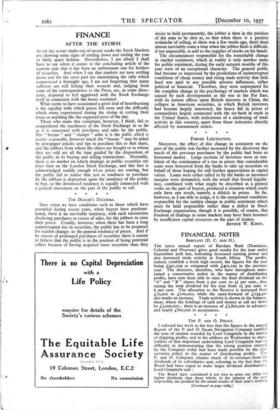THE DEALER'S DILEMMA.
Now when we have conditions such as those which have prevailed during recent years, when buyers have predomi- nated, there is an inevitable tendency, with each transaction disclosing purchases in excess of sales, for the jobbers to raise their prices. Usually, however, when there has been a long uninterrupted rise in securities, public has to be prepared for sudden changes in the general tendenciof prices. And if by reason of prolonged purchases of securities there is reason to believe that the public is in the position of being potential sellers because of having acquired more securities than they desire to hold permanently, the jobber is then in the position of the man to tv shot .at, so that when there is a positive avalanche of selling, as there was a few weeks ago, there inust almost inevitably come,a time when the jobber finds it difficult, if not impossible, to add to the supplies of stocks on his hands. The circumstances responsible for the remarkable change in market sentiment, which in reality is only another name for public sentiment, during the early autumn months of this year were of an exceptional character. The general public had become so impressed by the predictions of uninterrupted conditions of cheap money and rising trade activity that little heed was paid to any possible adverse influences, either political or financial. Therefore, they were unprepared for the complete change in the psychology of markets which was caused, by such developments as the war in the Far East, with its serious effects -upon British interests in China, the collapse in American securities, in which British investors had become largely interested, the heavy fall in prices of commodities largely connected with the set-back in trade in the United States, with indications of a slackening of trade activity in this country, apart from those industries directly affected by rearmament orders.






















































 Previous page
Previous page